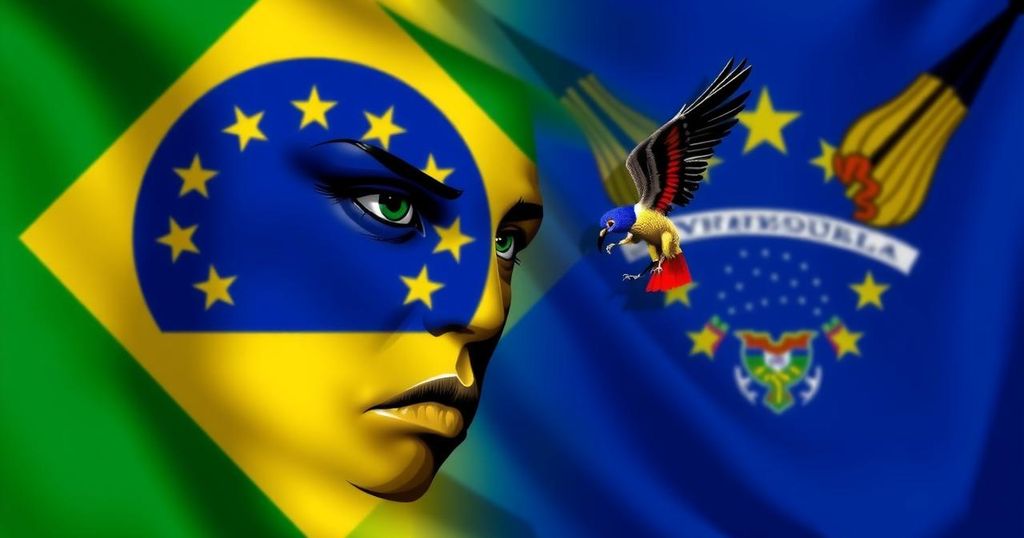Venezuela Expresses Outrage Over Brazil’s Brics Membership Veto

Venezuela has condemned Brazil’s decision to veto its admission into the Brics group, labeling the action as “immoral aggression.” This crisis follows a contentious presidential election in Venezuela, further straining relations between the two leftist governments. While Russian President Putin expressed support for Venezuela, he acknowledged Brazil’s position which remains a significant obstacle to Venezuela’s aspirations for Brics membership.
Venezuela has expressed considerable displeasure regarding Brazil’s recent decision to veto its accession to the Brics group, which encompasses major emerging economies. The Venezuelan Foreign Ministry has condemned this move, describing it as an act of “immoral aggression” amidst growing tensions between the two nations. This deterioration in relations follows a controversial presidential election in Venezuela during which President Nicolás Maduro declared victory, despite widespread assertions that the opposition candidate, Edmundo González, won decisively. Initially, Brazilian President Luiz Inácio Lula da Silva showed support for Maduro; however, he later withheld endorsement of the election results pending a detailed vote breakdown. While numerous foreign governments appear to acknowledge the opposition’s triumph, they have refrained from officially recognizing González as the new president. In a statement, Venezuela’s Foreign Ministry criticized Brazil’s ongoing refusal, stating, “The Brazilian foreign ministry has decided to maintain the veto that [former Brazilian president] Jair Bolsonaro has applied against Venezuela for years, reproducing the hatred, exclusion and intolerance promoted from the centres of power in the West.” Furthermore, the Venezuelan statement articulated the sentiments of its citizens, declaring that they feel “indignation and shame at this inexplicable and immoral aggression.” During the recent Brics summit held in Kazan, attended by over 20 world leaders, President Maduro approached the gathering with hopes of being integrated into the Brics framework, even asserting that Venezuela belongs in the “Brics family.” Despite Russian President Vladimir Putin’s alignment with Caracas on this issue, he acknowledged Brazil’s stance and indicated that Venezuela’s entry would require the consensus of existing members. Putin did mention his intention to facilitate improved relations between Brazil and Venezuela. The Brics alliance originated as a partnership between Brazil, Russia, India, China, and South Africa, yet has expanded to include nations such as Egypt, Ethiopia, Iran, and the United Arab Emirates. Lula is an advocate for the Brics movement, perceiving it as a means to reform global governance and increase representation for developing nations. Although he has criticized the stagnation of global institutions, observers argue the Brics themselves are hindered by internal conflicts, notably in light of Russia’s ongoing conflict in Ukraine and the disagreements between China and India. The latest summit was seen as an opportunity for President Putin to assert that efforts to ostracize Russia had failed, but such attempts have simultaneously highlighted fissures within the Brics coalition, particularly impacting the relationship between Brazil and Venezuela, which is at a significant low since Lula’s re-election.
The Brics grouping, which originally included Brazil, Russia, India, China, and South Africa, has been a platform for emerging economies to collaborate and strengthen their global influence. The recent addition of new members such as Egypt and Iran suggests a continuation of this trend towards inclusivity; however, the dynamics within the group, particularly the tensions relating to geopolitical conflicts, such as the war in Ukraine and regional disputes between member states, complicate the group’s cohesiveness. Venezuela has actively pursued membership in the Brics to bolster its standing in the global community, especially after facing isolation due to internal political controversies and accusations of electoral misconduct leading to President Maduro’s contested re-election. Brazil’s decision to maintain a veto against Venezuela’s inclusion reflects broader political ramifications and indicates a decline in bilateral relations driven by leadership changes and ideological differences.
In summary, Venezuela’s anger towards Brazil over its veto of Brics membership reflects deepening diplomatic tensions exacerbated by the fallout from Venezuela’s contentious presidential election. The historical context of Brazil’s stance towards Venezuela, particularly under previous administrations, plays a critical role in current relations. The recent developments at the Brics summit highlight not only Venezuela’s aspirations for inclusion but also the intricate geopolitical challenges within the Brics coalition itself, which must negotiate internal conflicts while responding to external pressures.
Original Source: www.bbc.com







